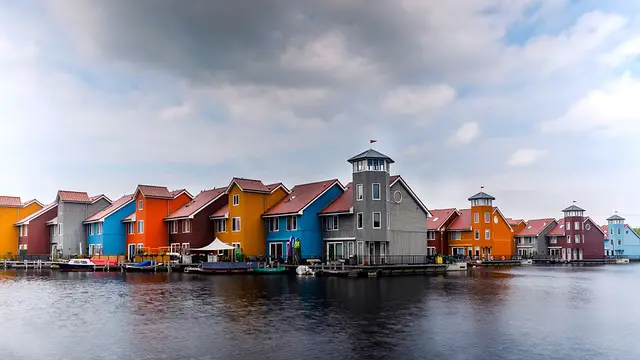
Studying at one of the world’s leading universities can be daunting. But learning from the best and taking advantage of exciting research opportunities is a once-in-a-lifetime treat. Why not live in a vibrant city where over a quarter of the population is students or professors. Along with being able to seek from your university experience, you’ll find it at the University of Groningen.
From art history to the art of international business, the University of Groningen is the place to be. With over 45 world-class Bachelor’s programs and 160 highly-ranked Master’s programs, we have a field of study for you, And, if you’re an exceptionally motivated and talented student, you could be eligible to join their Honours College and get even more from your time at the University of Groningen. This university is located in Groningen, the Netherlands.
As a student, you will be actively involved in research at one of Europe’s top research institutions from the get-go. The University of Groningen carries out ground-breaking and socially relevant research that builds bridges between disciplines and closes the gap between science and society. With research focused on Energy, Healthy Ageing, and a Sustainable Society, recent topics have included finding ‘greener’ plastics, ways to exercise more consciously, and the effects of climate change on birds.
The University of Groningen is the second oldest university in the Netherlands and has built a reputation for excellence. Many talented people have passed through the university during its rich 400-year history, including Nobel Prize winners like Ben Feringa and Frits Zernike. Some have been pioneers in their respective fields, such as the first female University student and the first female lecturer in the Netherlands, the first Dutch astronaut, and the first president of the European Bank.
In Groningen, you’ll see students everywhere: studying in the pretty Noorderplantsoen park, working various part-time jobs, and partying the night away. And, because it’s relatively affordable here, students live across the city, making all of Groningen your campus. Groningen is also a safe and green city to live in, with the quiet countryside only a short bike ride away. No wonder the city’s marketing slogan is #NothingTopsGroningen
However, How Can Students Be Accepted To The University of Groningen?
Great question! As a matter of fact, we can break down a subtle set of hints and tips as to what a student can do when applying for admission at the University of Groningen.
Let’s start with the highest level – Ph.D.:
All Ph.D. students need to seek admission to Graduate School before they can start their Ph.D. project. The Graduate School of Science and Engineering does not have fixed application deadlines but rather works on a ‘rolling admission’ system. This means that interested students can apply and be admitted to a Ph.D. program at any time.
When it comes to the enrollment for a student who is looking to acquire their Ph.D., this is what they must do:
- The applicant must meet all admission requirements necessary
- Without a doubt, the applicant will need to obtain any funding that is intended for the research and project duration
- It will be the job of the applicant to find a suitable supervisor
- And all in all the applicant will need to apply for the admission for a specific Ph.D. program that is available through the university
Let’s go through Bachelor and Master’s available programs:
Bachelor Programs:
- American studies
- Art History
- Arts, Culture and Media
- Communication and Information Studies
- English Language and Culture
- European Languages and Cultures
- History
- International relations and international organization
- Media Studies
- Minorities & Multilingualism
- Econometrics and operations research
- Economics and business economics
- International business
- Applied mathematics
- Applied physics
- Artificial intelligence
- Astronomy
- Biology
- Biomedical Engineering
- Chemical engineering
- Chemistry
- Computing science
- Industrial engineering and management
- Life Science and Technology
- Mathematics
- Pharmacy
- Physics
- Medicine
- Human Geography and Planning
- Spatial Planning and Design
- Psychology
- Philosophy of a specific discipline
- International and European law
- Religious Studies
- Liberal Arts and Sciences
- Global Responsibility and Leadership
Master’s Programs that are available:
Archeology (research)
- Arts and Culture
- Arts, Cognition and Criticism
- Arts, Policy and Cultural Entrepreneurship
- Art History
- Curatorial Studies
- Film and Contemporary Audiovisual Media
- History of Architecture and Town Planning
- Music, Theater and Performance Studies
- Arts and Culture (research)
- Cultural Leadership (research)
- Arts, Media and Literary Studies (research)
- Classics and Ancient Civilizations
- Ancient History
- Classics
- Communication and Information Science
- Digital Humanities
- Information Science
- European Studies
- Euroculture (erasmus mundus)
- History
- History Today
- History (research)
- Classical, Medieval and Early Modern Studies (research)
- International Relations
- East Asian Studies
- European Politics in a Global Perspective
- Geopolitics & Connectivity
- International Relations and International Organization
- International Political Economy
- International Security
- International Relations 120 ECTS
- International Humanitarian Action (NOHA)
- International Relations (research)
- Modern History and International Relations (research)
- Linguistics
- Applied Linguistics
- Theoretical and Empirical Linguistics
- Multilingualism
- Linguistics (research)
- Clinical Linguistics / EMCL+ (research, Erasmus Mundus)
- Language and Cognition (research)
- Language and Communication Technologies (LCT) (research) erasmus mundus
- Literary Studies
- English Literature and Culture
- European Literatures and Interculturality
- Writing Editing and Mediating
- Media Studies 90 ECTS
- Datafication and Digital Literacy
- Journalism
- Media Creation and Innovation
- Social Media and Society
- Middle Eastern Studies
- North American Studies
- American Studies
- Behavioral and Social Sciences (research)
- Educational Sciences:
- Learning in Interaction
- Pedagogical Sciences:
- Deafblindness
- Ethics of education: history, philosophy and law
- Youth 0-21, Society and Policy
- Psychology
- Work, Organizational and Personnel Psychology
- Applied Social Psychology
- Clinical Psychology
- Clinical Neuropsychology
- DDM Sustainability and Environmental Psychology
- Applied Cognitive Neuroscience
- Clinical Forensic Psychology and Victimology
- Environmental Psychology
- Theory and History of Psychology
- Talent Development and Creativity
- Accountancy and Controlling
- DDM Chinese Economy and Finance
- Business Administration
- Change Management
- Management Accounting and Control
- Small Business and Entrepreneurship
- Strategic Innovation Management
- Health
- Econometrics, Operations Research and Actuarial Studies
- DDM Chinese Economy and Finance
- Economic Development and Globalization
- DDM Chinese Economy and Finance
- DDM Central-East European Economies
- DDM International Development Economics
- DDM Economic Development and Growth (MEDEG)
- Economics
- DDM Chinese Economy and Finance
- DDM Economics and Economic Analysis
- Finance
- DDM Finance
- DDM Chinese Economy and Finance
- Human Resource Management
- International Business and Management
- DDM Advanced International Business Management and Marketing
- DDM Chinese Economy and Finance
- International Financial Management
- DDM Chinese Economy and Finance
- DDM International Financial Management
- Marketing
- DDM Strategic Marketing Intelligence
- DDM Marketing and finance
- DDM Chinese Economy and Finance
- DDM Marketing Information Systems
- Marketing Analytics and Data Science profile
- Marketing Management profile
- Research Master in Economics and Business
- Supply Chain Management
- Technology and Operations Management
- DDM Operations Management
- Climate Adaptation Governance
- Tourism Geography and Planning
- Sustainable Entrepreneurship
- Voice Technology
- Behavioral and Cognitive Neurosciences (research)
- Behavioral and Social Sciences – Research
- Biomedical Engineering
- Biomedical Sciences
- Biomolecular Sciences (selective)
- Clinical and Psychosocial Epidemiology (research)
- Health Systems and Prevention (research)
- Clinical Neuropsychology
- Ecology and Evolution (selective)
- Energy and Environmental Sciences
- Human Movement Sciences
- Molecular Medicine and Innovative Treatment (research)
- Innovative Medicine
- Medical Pharmaceutical Sciences
- Sport Sciences
- Energy and Climate Law
- European Law in a Global Context
- Global Criminal Law
- Governance and Law in Digital Society
- International Commercial Law
- International Human Rights Law
- Public International Law
- Philosophy
- Philosophy (research)
- Philosophy, Politics and Economics
- Philosophy, Science and Humanities
- Applied Mathematics
- Applied Physics
- Artificial Intelligence
- Astronomy
- Behavioral and Cognitive Neurosciences (research)
- Biology
- Biomedical Engineering
- Biomolecular Sciences (selective)
- Chemical Engineering
- Chemistry
- Computing Science
- Computational Cognitive Science
- Energy and Environmental Sciences
- Industrial Engineering and Management
- Marine Biology (selective)
- Mathematics
- Science Education and Communication
- Mechanical Engineering
- Molecular Medicine and Innovative Treatment (research)
- Nanoscience (top master)
- Physics
- Water Technology
- Economic Geography
- Economic Geography: Regional Competitiveness and Trade
- Environmental and Infrastructure Planning
- DDM Development Planning and Infrastructure Planning
- DDM Water and Coastal management
- DDM Urban Governance within a Global Environment
- DDM Urban Planning, Environment and Infrastructure
- Population Studies
- DDM Social demography
- DDM Demography and Social Inequality
- Real estate studies
- Society, Sustainability and Planning
- DDM Urban Planning, Society and Sustainability
- Spatial Sciences (research)
- Islands and Sustainability (Erasmus Mundus)
- Theology and Religious Studies
- Religion and Pluralism, Ancient & Modern
- Religion and Cultural Heritage
- Religion, Conflict and Globalization
- Religion, Health and Wellbeing
- Theology and Religious Studies (research)
The Full Assessment
The only officially and correct way to end up as part of the student population percentage that is granted admissions is to be academically excellent. This means that a student who has an average grade point average (United States Grading Scale Technique) that is equal to or above 89% or a standard B+. The majority of the time students who receive a 92% or an A- equivalent are more sought after as the particular academically inclined student.
Another indication is if the student who is wishing and has sent in their admissions application plus letters of recommendation and personal statement… fits in with the criteria or “what the school wishes to see from their diverse student population.”
The financial aspect does not quite matter to any extent as long as the student knows how they will eventually pay back student loans or will be able to pay off their tuition. That is unless they have acquired a heft and rewardful scholarship that covers all tuition fees and excess fees. And in this respect, any student signing up to be accepted to any university should be applying for scholarships, no matter what.
For example, if a student from a developing country wishes to attend this university they should seek out research that covers the topic of fully-funded scholarships that will cover every aspect of their higher education career.
Let’s check out what scholarships are available from the University of Groningen:
- Faculty-funded PhD position scholarship
- Ph.D. Scholarship Program
- University of Groningen Grantfinder Scholarship
- Doctoral Grant for Teachers (NWO)
- Netherlands Student Grantfinder
- Wessel Ganzefoort Fund
- Holland Scholarship
- Van der Veen-Schenkeveld scholarship for promising female African theologians
- Protestant Theological University Scholarship
Just to name a few. However, the university works with a number of private funds and public to help students to achieve a scholarship that can help to some advantage. There are several Netherlands scholarships available for international and domestic students as well.
Further Research
While the university caters to multiple areas of field study, it should be stated that the university generally accepts students who wish to study for 4-years. And as a full-time student. There is no judgment based on students who wish to have a shorter educational career and work as part-time students. However, with this university being on the top 100 list for several years now, it goes to show that full-time students will be accepted at a higher capacity than part-time applicants.
All applicants must show interest in gearing up and putting in the research work for that Ph.D. As you’ve already read through the top section, Ph.D. programs exist on a higher basis within this university. And probably because the university is known as one of the better research institutes in the world. So that means they are constantly looking for alumni who wish to achieve and secure that Ph.D.
Why Is Integrating Into the Groningen Culture So Important?
Did you know that when students are so keen interest in a city where the university is located… this can lead to being accepted to that university? It shows desire and interest to understand that countries culture and language. This also shows that the university’s admissions council that the student is well-rounded enough that they could try attending school in a different country. This shows the student is serious about their education and about understanding another culture.
This is hugely important on a number of scales and this will show through an applicant’s admissions submission when they send it in. Showing avid curiosity for a new city and culture is exactly what a university looks for.
Ask Other Alumni
Sounds so simple, and yet we don’t take advantage enough when it comes to asking prior students what did they write down on the submission of their admission. This can be an excellent insight into what the university saw in that particular person. This also allows you as the student to see what you have to offer the university. Was the alumni priority accepted because of the obstacles they overcame? The 4-year field study they intend to succeed in? Did they show reassuring leadership skills? Did they describe how they have waited to be engrossed in a lifestyle that only the Netherlands can provide?
These are the right questions to ask and to see where you yourself fit into the university admissions equation.
Personal Statement Should Not Be Solely Me, Me, Me
How about reading example personal statements online for starters? This is a great tactic to use, because at times when it comes to writing about one’s self… what happens? Every sentence starts with ‘I’ or ‘me.’ In reality, this is a huge and big NO that will be streamed across the application form. Students should look up how to describe themselves without sounding overly conceited or narcissistic. Because admission judges do look for this tactic, it shows a lack of personal understanding and a lack of leadership skills.
Don’t Lie About Anything
The number one rule and guideline every university repeats again and again… do not to lie about any information. This means lying about a name, address, e-mail address, phone number, or anything is grounds for that application being ignored or tossed. So applicants should never write down anything that can be proven false. This is grounds for expulsion as well.
Don’t Lie About Acquiring A Student Visa
Any international student knows that if they are accepted to a foreign university that 100% they will need to acquire a student visa. And there is no other way around it. Student visas are government property that gives any student clearance to be in a country longer than what a typical passport may grant. Also, a student visa can grant some students within a different country certain rights and insurance. This is highly important and no student should ever skip this essential step.
It is also not the university’s responsibility the ensure that the student receives their student visa. That is entirely up to the individual who wishes to attend a different university in a different country. Nevertheless, a student should understand and contact their embassy or immigration center to ask about how to secure a student visa. There are guidelines to follow and paperwork that will be needed to fill out. This is the responsibility of the student, and no one else.
Also, a family member cannot fill out any paperwork for a student. By all means, they can help spell things out but they cannot be the ones to fill out anything.
Call or E-Mail Admissions
No student should ever be afraid to contact admissions about any questions. Although be sure to go through the questions and answers section that is on the university website. If there is a question that has not been answered or if a student would like to inquire further, they should use any contact information that is given on the university website. This is essential. Admissions will even give a set of guidelines to help students to submit all of the additional documents that may be needed for admissions.
This is the best way for a student to ask for help.


















Hello all,
I am Faten from Jordan and i am interested in Groningen university to take a chance to complete a master degree in architecture but i want to help me in the requirements to get a scholarship.
i finished my master degree in architecture with 3.91/4 and i have an IElts score 6.
Hi Faten. You have to check with the Groningen university if they have this scholarship and if you eligible for it, that means if you meet all the scholarship requirements.